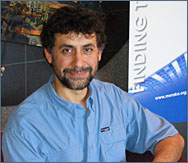
Grigoris Antoniou, University of Huddersfield, UK
“Large-Scale Semantic Web Reasoning” (slides)
ABSTRACT:
Data originating from theWeb, sensor networks and social media result in increasingly huge datasets. The so called Big Data creates new opportunities for advanced applications in domains ranging from smart cities to intelligent healthcare, hence the increasing interest in academia and industry. Usually Big Data is associated with machine learning / data mining. This talk will argue that semantic and knowledge technologies have an important role to play.
Traditionally, reasoning approaches have mostly focused on complex knowledge structures/programs and centralized in-memory data, so the question arises whether and how they can be adapated to scale sufficiently to meet the Big Data challenges. This talk will review seminal work on large-scale massivelt parallel RDFS reasoning, before turning its attention to more recent works addressing more complex reasoning tasks (computing the well-founded semantics of logic programs, and ontology diagnosis and repair). The talk will conclude with a number of open research challenges in the area.
BIO:
Grigoris Antoniou is Professor of Computer Science at the University of Huddersfield, UK. Previously he has held professorial appointments at the University of Crete (where he was also Head of the Information Systems Laboratory at FORTH-ICS, the top-rated research institute in Greece), Griffith University, Australia, and the University of Bremen, Germany. His research interests lie in semantic technologies, particularly knowledge representation and reasoning and semantics for big data, and its application to ambient intelligence, e-health, and transportation. He has published over 200 technical papers in scientific journals and conferences. He is author of three books with international publishers (MIT Press, Addison-Wesley); his book “A Semantic Web Primer” is internationally the standard textbook in the area, and has been or is about to be translated to Japanese, Chinese, Korean, Spanish and Greek. In recognition of his work, he was elected an ECCAI Fellow in 2006, joining the prestigious list of the best AI researchers in Europe. He is member of three editorial boards of journals, has organised a number of conferences and workshops (including leadership positions at ESWC 2010 and 2011), and has served in numerous programme committees. He has led a number of national and international research projects, and has participated in many more.

Gilberto Câmara, National Institute for Space Research (INPE), Brazil
“DEVELOPING ONTOLOGIES FOR LAND COVER AND LAND USE DATA”
ABSTRACT:
Land cover and land use change happens when humans adapt the natural environment to their needs, as in the case of replacing natural forests with pasture. Communicating the state of the environment is crucial in an age of global change, when humanity is controlling most of the Earth´s ecosystems. This keynote will discuss the promises and the challenges of building domain ontologies for land use and land cover data. Despite major efforts on land ontology research, including developing ISO standards for land classification, there are still major open issues that limit their general use. This talk will use some examples from real-life applications to stress the need for continued research on ontologies that can capture change in our global environment.
BIO:
Gilberto Câmara is a Brazilian researcher in Geoinformatics, Spatial Databases, and Environmental Modelling at the Image Processing Division of Brazil’s National Institute for Space Research (INPE). He is internationally recognized for promoting free access for geospatial data and for setting up an efficient satellite monitoring of the Brazilian Amazon rainforest. As recognition for his work, he was inducted as a Doctor honoris causa from the University of Münster (Germany) and as a Chevalier (Knight) of the Ordre National du Mérite of France. He received the Global Citizen Award of the Global Spatial Data Infrastructure Association. He is also a Fellow of the Faculty of Geoinformation Science and Earth Observation (ITC) in the Netherlands and a Senior Member of the Association for Computing Machinery (ACM).

Enrico Franconi, Free University of Bozen-Bolzano, Italy
“Ontologies with Data or: the death of the AI dream” (slides)
BIO:
Enrico Franconi is associate professor at the Free University of Bozen-Bolzano, Italy, where he is the director of the KRDB Research Centre for Knowledge and Data. His main research interest is on knowledge representation and reasoning technologies applied to databases – and in particular description logics, temporal representations, conceptual modelling, intelligent access to information, natural language interfaces. Recently he has been involved as Principal Investigator of the European projects “SEmantic Webs and AgentS in Integrated Economies” (SeWAsIE), of the European Network of Excellence “Realizing the Semantic Web” (KnowledgeWeb), of the European Network of Excellence “Interoperability Research for Networked Enterprises Applications and Software” (InterOp), of the European basic research project “Foundations of Data Warehouse Quality” (DWQ), of the Marie Curie Action “A Network for Enabling Networked Knowledge” (NET2), and as co-investigator of the European basic research project “Thinking Ontologies” (Tones). He was member of the Advisory Committee of the World Wide Web Consortium (W3C). He is in the editorial board of the Journal of Applied Logic (JAL), published by Elsevier. He is the author of more than 150 publications in international workshops, conferences, and journals.
 ONTOBRAS – Brazilian Ontology Research Seminar
ONTOBRAS – Brazilian Ontology Research Seminar